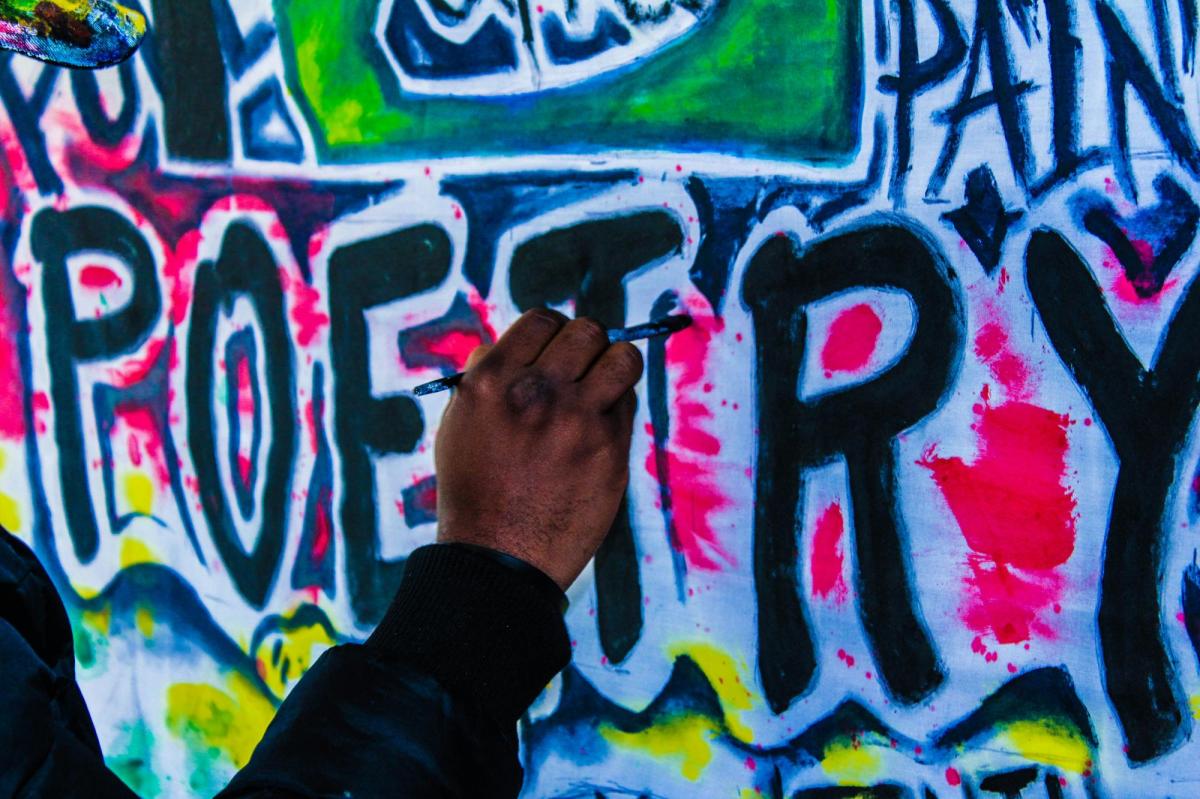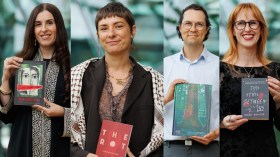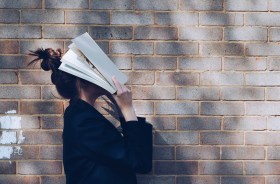Imagine, you’re left hanging on the line – with anodyne muzak in your ear – when waiting impatiently for a human to respond from a major retailer or government agency. Imagine your daily public transport commute – you look up from doomscrolling for a minute and see billboards overhead advertising the latest cereal or energy pep drink.
Now imagine that instead of these streams of background noises and advertorial wallpaper that make up so much of your waking existence, you are, instead, greeted by mellifluous voices reciting accessible, meaningful poetry and a string of haiku plastered on the walls of your 7.45am train as it wends its way into the CBD: momentary whimsy before the pull of work and industry.
Imagine that instead of bulletins touting weight-loss programs, there are one-line poems – monostiches – written on strips of paper and attached to traffic poles, with serrated edges that you can tear away.
If only we could normalise poetry, bring it into our daily lives instead of only recalling its relevance during momentous events like funerals and weddings. W H Auden’s ‘Funeral Blues’, an elegy to a deceased lover that began with the plea ‘Stop all the clocks/Cut off the telephone’ that was recited in the blockbuster movie Four Weddings and a Funeral, was probably the first time many people had even heard of the poet. And yet, how affecting and poignant was its address to grief? Those few concise lines cut to the marrow of the matter and that is poetry’s gift: to distill moments of gravitas or to play with capturing the essence of a particular time and place. From pomp to picayune, there’s never a moment that can’t be expressed in a few emotionally-charged lines.
Imagine the surprise of discovering accidental poetry. South Australia’s initiative, Raining Poetry in Adelaide, should be extended to other states. The scheme involves stencilling three lines of various poems with invisible ink on footpaths, which only appear when wet. Having been fortunate enough to be one of the featured poets in this event several times, I can say it is indeed a joyful experience to stumble across words that appeared like magic – like mushrooms after a downpour.
During COVID times a snippet of one of my poems was also illustrated and placed on a large poster in the Melbourne CBD, alongside the work of other writers. Unfortunately, due to health regulations and a directive to stay at home, the foot traffic then was minimal, so not many salary people and visitors were able to see these text and art cross-pollinations as they went about their business. I’d welcome another similar venture, with billboards erected in the middle of a city square to arrest attention, if only to coax a few minutes of distraction, before the normal grind of life reclaims you.
We are all so caught up in the hustle, seeing accidental poetry in places where you least expect it to be will cause you to stop, feel a frisson of interest while you take in the words and, for a moment at least, wonder.
Melbourne CBD, for instance, is presently in the midst of installing a new rail system. How delightful it would be if the local council could take the lead from London’s Poems on the Underground – an idea that started in 1986 and is still going strong – to position poems on trains, so the English capital’s three million-odd commuters can bear witness to works both new and old.
Poetry Month has just ended, a showcase that promotes and amplifies this art form every year, platforming a suite of writers and other celebrities not usually associated with poetry, and prompting others to write their own. It’s a laudable event, but wouldn’t it be wonderful if, instead of it being sequestered and celebrated in just 30 odd days per year, poetry was something that could be seen and heard and experienced all around us, a daily happenstance, as we go about our days?
At some unspecified time next year, Australia will have an official Poet Laureate for the very first time, an embarrassing oversight that will finally be rectified. It is to be administered by a new federal government body, Writers Australia; the details surrounding what the position entails, and indeed even the selection criteria, are opaque.
Whether the anointed one is expected to contribute by penning odes that mark political rises and disgraces and other matters deemed of national importance, or left alone to play with words at their own discretion, is yet to be revealed.
But whether the role encompasses a more democratic voicing of ordinary people’s everyday concerns à la The Young One’s Rik Mayall’s “People’s Poet” or a more individual remit of interest, here’s a plea and a provocation to the incoming Poet Laureate: please devote a bit of time to freeing poetry from dusty, educational imperatives and within printed pages that only a select number of people – usually other poets – will ever read.
Read: Industry responses to Australia’s Poet Laureate position
Let’s instigate a nationwide plan whereby poetry is hidden and found in nooks and unexpected places, to inspire awe and curiosity. We have an abundance of Australian poets whose works are unknown and underappreciated by the populace. Let’s disseminate their words widely, everywhere and at once.
Poetry still has a reputation of being esoteric and elitist so let’s bring it down from the ivory tower and distribute it freely so it doesn’t remain within the domain of the few.
As I said in my own poem:
If I were Poet Laureate: a mandate
1. Acrostics across the sky
Petrarchan sonnets on bridges
connecting lovers on opposite cities.2. Low-flying drones to drop care packages
a confetti of verses on downtrodden heads
scraps of bibliotherapy for the desolate.3. Neon glow-in-the-dark chalk deployed
by a rag-tag of street urchins
cursive beacons in the inky gloom.4. Public transit graffitied with couplets
literal concrete poetry on worksites
ballads on bollards tankas on tonka trucks.5. Haiku hung aloft every street lamp
elegies sung by honeyeaters with golden bells
a choral cantata to rouse the sunken.






